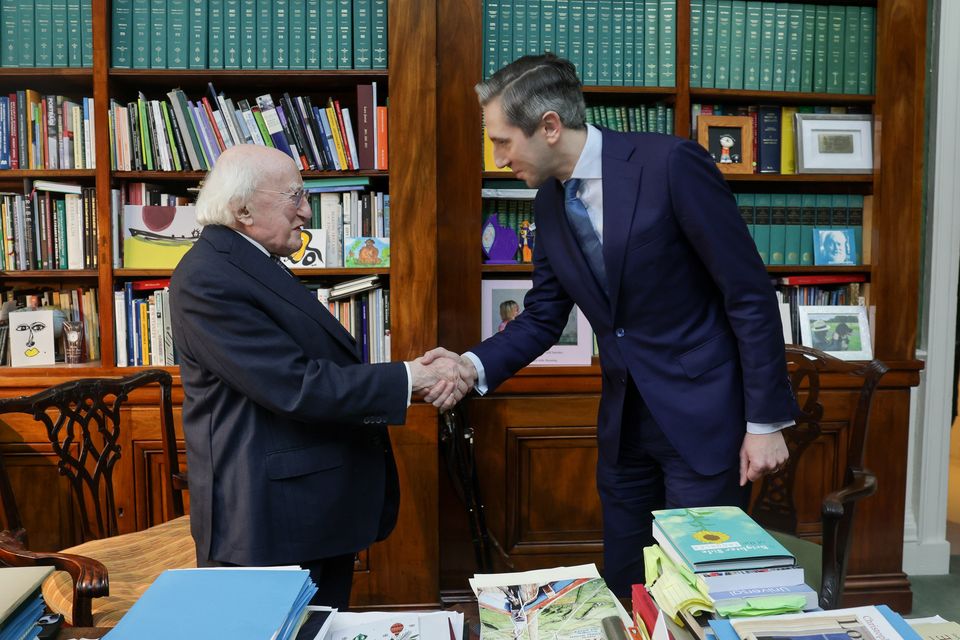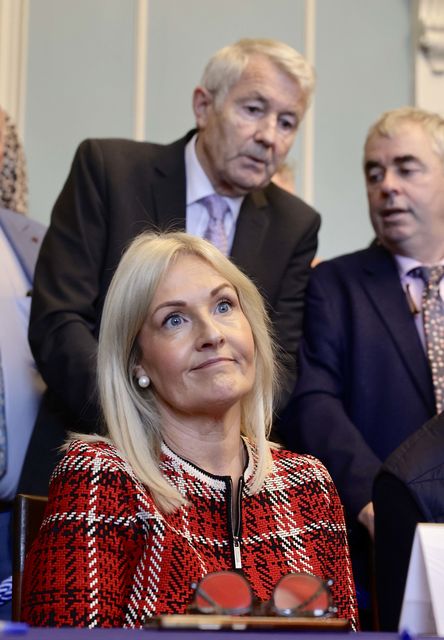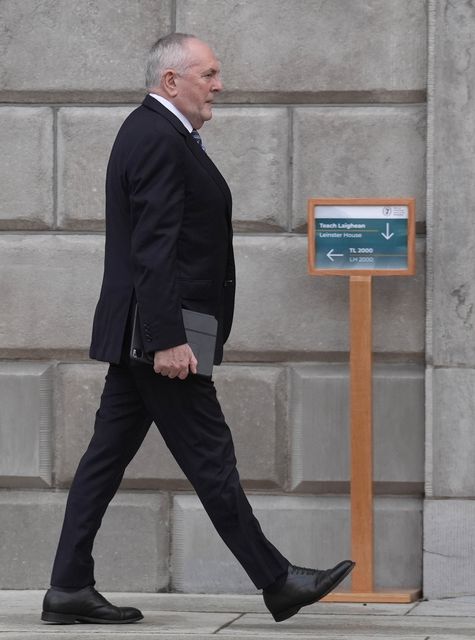Verona Murphy has become the first female speaker of the Irish parliament as part of a deal to form a coalition government.
Ms Murphy, an independent TD for Wexford, defeated two Fianna Fail candidates and one from Sinn Fein to win the 255,000-euro-a-year position of Ceann Comhairle.
Her election is the first action taken by the new Dail which met for the first time on Wednesday morning.
Irish premier Simon Harris formally tendered his resignation to President Michael D Higgins earlier, as part of the formalities of a new Dail convening.
Irish President Michael D Higgins with Simon Harris (Maxwells/PA)
Mr Harris and the outgoing cabinet will remain in their roles as no party holds a majority and talks to form a government are ongoing.
As the Dail resumed on Wednesday, the names of 174 new TDs were read into the record before a vote was held on electing the Ceann Comhairle.
Independent TD for Wexford Ms Murphy emerged as the winner after reaching the quota of 87, and finished with a total of 89 votes.
She is the first woman to hold the role.
She was followed by Sinn Fein’s Aengus O Snodaigh, who finished on 67 votes.
Ms Murphy was recommended by the Fine Gael and Fianna Fail leaders as part of negotiations to form a government.
The other three candidates for the role raised concerns about this process to elect a speaker, arguing it infringed on the primacy of the Dail.
Addressing TDs before her election, Ms Murphy said she would “uphold” principles of treating each member of the Dail equally.
Verona Murphy during the first sitting of the 34th Dail (Maxwells/PA)
“In order to ensure that every member is heard, this House must function smoothly and efficiently. Every member is equal, irrespective of their political persuasion, political party or grouping, every member has a mandate, and no one mandate is more important than the other.
“Much debate has been heard around the turnout in the recent election. In many constituencies, the turnout dropped below 50%.
“Large numbers of people in the electorate feel alienated from the political process. They feel politicians are removed from the reality of day-to-day life. They feel that this chamber is a talking shop that achieves nothing.
“It is incumbent on all of us to change that perception, to make the House more relevant to those that feel excluded.”
Fianna Fail’s John McGuinness, who lost out on becoming the next speaker, said the Dail can often be sidelined.
He said “the government” can sometimes be reduced to “just the cabinet” or “just the leaders of the groups in that coalition”.
“I believe that this House has to exercise its strength and its caution around all of the changes that have occurred in politics,” he said.
Mr O Snodaigh said it was important that the person elected can speak Irish in a bilingual chamber.
The party’s spokesman for An Ghaeilge said a parliamentary chair is needed who can monitor comments in either English or Irish, and pointed out that the first official language of the state is Irish.
He said the person elected should also be impartial and facilitate the House coming together, rather than “seeking the limelight for themselves”.
The incumbent in the role, Sean O Fearghail, said he had not planned to put himself forward for another term.
“I always intended to stand down after two terms as Ceann Comhairle but in the final days of the last Dail, people from across the political spectrum, for whom I have great personal respect and admiration, began to approach me,” he said.
“They asked me to consider standing again in order to provide continuity, to provide stability and to play a significant role in smoothing the transition from the 33rd to the 34th Dail.
“After careful reflection, I decided to put myself forward. I’m wondering today, was that such a good idea after all.”
The Fianna Fail TD said people do not feel “engaged” in the political system, and are frustrated and disenfranchised, and added it was up to elected politicians to change that.
“We must aim to include, not exclude, to engage and not isolate. To change this, we need to come together and overcome what are relatively minor difficulties very often between us,” he said.
John McGuinness arrives at Leinster House in Dublin (Brian Lawless/PA)
“Today, the House faces a difficult choice in Aengus, Verona and John. You have three other candidates for whom I have the height of respect, having worked with each of them for many years.
“I acknowledge their calibre, ability and commitment and contribution to Irish political life and the vision that they set out today.
“In conclusion, for those of you who know me and have worked with me in the past, you know what I stand for and how I will work.”
Fine Gael and Fianna Fail – the two main coalition partners in the last government – bucked a global trend of electorates ousting governments and instead increased their support, leaving them just two seats short of a majority.
The parties, forged from opposing sides of Ireland’s Civil War, who entered government together for the first time in 2020, are expected to rely on independents to make up the final numbers.
Though the centre-left Social Democrats and Labour Party have yet to rule themselves out of government talks, momentum is behind the Regional Group of nine independent TDs to enter government.
Talks are expected to continue in the coming days before breaking for the Christmas period and resuming in January.


